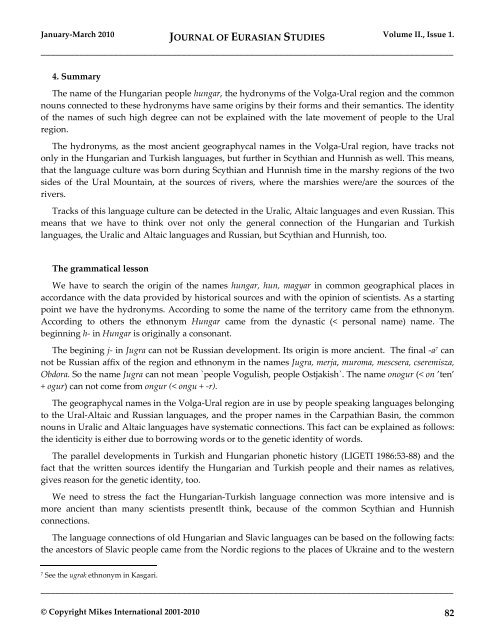EurasianStudies_0110..
EurasianStudies_0110..
EurasianStudies_0110..
You also want an ePaper? Increase the reach of your titles
YUMPU automatically turns print PDFs into web optimized ePapers that Google loves.
January-March 2010 JOURNAL OF EURASIAN STUDIES Volume II., Issue 1.<br />
_____________________________________________________________________________________<br />
4. Summary<br />
The name of the Hungarian people hungar, the hydronyms of the Volga-Ural region and the common<br />
nouns connected to these hydronyms have same origins by their forms and their semantics. The identity<br />
of the names of such high degree can not be explained with the late movement of people to the Ural<br />
region.<br />
The hydronyms, as the most ancient geographycal names in the Volga-Ural region, have tracks not<br />
only in the Hungarian and Turkish languages, but further in Scythian and Hunnish as well. This means,<br />
that the language culture was born during Scythian and Hunnish time in the marshy regions of the two<br />
sides of the Ural Mountain, at the sources of rivers, where the marshies were/are the sources of the<br />
rivers.<br />
Tracks of this language culture can be detected in the Uralic, Altaic languages and even Russian. This<br />
means that we have to think over not only the general connection of the Hungarian and Turkish<br />
languages, the Uralic and Altaic languages and Russian, but Scythian and Hunnish, too.<br />
The grammatical lesson<br />
We have to search the origin of the names hungar, hun, magyar in common geographical places in<br />
accordance with the data provided by historical sources and with the opinion of scientists. As a starting<br />
point we have the hydronyms. According to some the name of the territory came from the ethnonym.<br />
According to others the ethnonym Hungar came from the dynastic (< personal name) name. The<br />
beginning h- in Hungar is originally a consonant.<br />
The begining j- in Jugra can not be Russian development. Its origin is more ancient. The final -a 7 can<br />
not be Russian affix of the region and ethnonym in the names Jugra, merja, muroma, mescsera, cseremisza,<br />
Obdora. So the name Jugra can not mean `people Vogulish, people Ostjakish`. The name onogur (< on ’ten’<br />
+ ogur) can not come from ongur (< ongu + -r).<br />
The geographycal names in the Volga-Ural region are in use by people speaking languages belonging<br />
to the Ural-Altaic and Russian languages, and the proper names in the Carpathian Basin, the common<br />
nouns in Uralic and Altaic languages have systematic connections. This fact can be explained as follows:<br />
the identicity is either due to borrowing words or to the genetic identity of words.<br />
The parallel developments in Turkish and Hungarian phonetic history (LIGETI 1986:53-88) and the<br />
fact that the written sources identify the Hungarian and Turkish people and their names as relatives,<br />
gives reason for the genetic identity, too.<br />
We need to stress the fact the Hungarian-Turkish language connection was more intensive and is<br />
more ancient than many scientists presentlt think, because of the common Scythian and Hunnish<br />
connections.<br />
The language connections of old Hungarian and Slavic languages can be based on the following facts:<br />
the ancestors of Slavic people came from the Nordic regions to the places of Ukraine and to the western<br />
7 See the ugrak ethnonym in Kasgari.<br />
_____________________________________________________________________________________<br />
© Copyright Mikes International 2001-2010 82

















